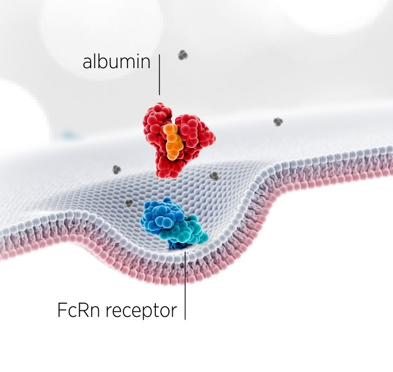New cancer target identified for albumin enabled anti-cancer therapeutics
Researchers from the NanoPharmaceutical Lab at the Interdisciplinary Nanoscience Center (iNANO) Aarhus University led by Associate Professor Ken Howard, together with researchers from Albumedix Ltd., have identified a novel target in several cancer types that may pave the way for efficient delivery of drugs into cancer cells using the blood protein albumin as a carrier.

In 2014, Associate Professor Ken Howard (iNANO and Department of Molecular Biology and Genetics) and researchers from albumin-focused biotechnology company Albumedix had a vision, which was to harness the transport properties of albumin for site-selective drug delivery into disease cells. Thereby, ensure more efficient and safer treatment for patients (1).
Today, a major leap towards this goal has been taken with the publication of a joint patent between iNANO and Albumedix that describes the overexpression of an albumin binding receptor in several cancer types providing a novel target for site-selective drug delivery.
Albumin is a blood protein that has a predominant role in the transport of nutrient molecules required for healthy cell growth. Its functions are facilitated by its long residence time in the blood due to engagement with the cellular recycling neonatal Fc receptor (FcRn) recently published by Howard et al. and Albumedix (2). The overzealous requirement of cancer cells for nutrients prompted the team to investigate whether over production of FcRn occurs in tumours, if this could be used as a method to quench the nutrient thirst and if it could explain previously reported albumin accumulation in tumours (3).
Approximately 500 biopsies from cancer patients were provided by the team of Clinical Professor Torben Steiniche at Department of Clinical Medicine and Department of Pathology at Aarhus University Hospital for the purpose. Identification of the over production of FcRn in a broad range of cancer types screened from ~500 cancer patient biopsies was a groundbreaking result that is the basis for the published patent. Furthermore, Albumedix’ engineered recombinant albumins (Veltis®) specifically designed with an unprecedented high affinity towards this receptor, was shown to exhibit greater accumulation in tumours implanted in mice. This offers a potential strategy for site-specific delivery of cancer drugs without toxic side effects associated with conventional anti-cancer medicines.
“This is exciting work. It offers potential for site-selective targeting of drugs to cancer cells, thus, overcoming a major hurdle in cancer therapeutics. The invention is based on sound scientific rationale and biological understanding that was executed through our long-standing relationship with Albumedix facilitated by generous support from Innovation Fund Denmark. Harnessing the transport properties of a natural protein rather than relying on complicated drug delivery designs potentially offers a shorter path to clinic. Focus now is on incorporation of anti-cancer drugs into the albumins achieved through continued strong interaction and collaboration with Albumedix Ltd.” says Associate Professor Ken Howard (Aarhus University)
“Through a great and long collaboration with Ken Howard and his group at iNANO, facilitated by DKK 9 million grant from the Innovation Fund Denmark, we are closer to better understanding the full potential of our engineered albumins in the fight against cancer – a fight where albumin-enabled therapeutics might provide an alternative treatment approach” says Jason Cameron, Science Director at Albumedix.
Read also the press release published by Albumedix.
Patent title: “Identification and treatment of tumors characterized by an overexpression of the neonatal Fc receptor”
Patent number: WO2018/082758
Inventors: Kenneth Alan Howard (AU, iNANO), Jason Cameron (Albumedix Ltd.), Maja Thim Larsen (AU, iNANO), Frederik Dagnæs-Hansen (AU, Department of Biomedicine)
For further information, please contact:
iNANO: | |
Associate Professor Kenneth Howard Interdisciplinay Nanoscience Center Department of Molecular Biology and Genetics Aarhus University Denmark Tel. +45 87155831 Email: kenh@inano.au.dk |
(Photo: Maria Randima, AU Communication) |
Albumedix: Jonas Skjødt Møller +45 4446 2227 jsqm@albumedix.com | |
References:
- http://scitech.au.dk/en/about-science-and-technology/current-affairs/news/show/artikel/kroppens-eget-transportprotein-kan-goere-laegemidler-mere-effektive/
- Esben G. W. Schmidt, Michael L. Hvam, Filipa Antunes, Jason Cameron, Dorthe Viuff, Birgitte Andersen, Nanna N. Kristensen, Kenneth A. Howard* (2017). Direct demonstration of an FcRn-driven endosomal sorting pathway for cellular recycling of albumin. Journal of Biological Chemistry, 292 (32), 13312-13322.
- Matsumura, Y. and H. Maeda, A new concept for macromolecular therapeutics in cancer chemotherapy: mechanism of tumoritropic accumulation of proteins and the antitumor agent smancs. Cancer research, 1986. 46(12 Pt 1): p. 6387-92.

